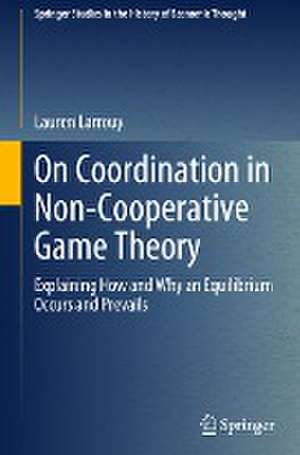On Coordination in Non-Cooperative Game Theory: Explaining How and Why an Equilibrium Occurs and Prevails: Springer Studies in the History of Economic Thought
Autor Lauren Larrouyen Limba Engleză Hardback – 18 aug 2023
Analyzing the history of economic thought, the book highlights the methodological issues faced by standard game theory in its treatment of strategic reasoning and the consequence it has on the status of players’ beliefs. It also highlights how the two original contributions of T. C. Schelling and M. Bacharach can be applied to these issues. Furthermore, the book assesses the intersubjective dimension in games by applying the cognitive sciences and by integrating simulation theory into game theory.
Consequently, this book offers an interdisciplinary approach for reassessing the nature of the intersubjectivity involved in strategic reasoning. It shows that the analysis of games should involve the study and identification of the reasoning process that leads the players to a specific outcome, i.e., to a specific solution. A game should not be understood (as is done in standard game theory) as a mathematical representation of an individual choice at equilibrium. This requires investigating the players’ capacity for coordination. Understanding the process of coordination allows us to understand strategic reasoning and ultimately to provide new answers to the indeterminacy problem, one of the central hurdles in game theory, and one that underscores its normative difficulties.
Preț: 735.84 lei
Preț vechi: 897.36 lei
-18% Nou
Puncte Express: 1104
Preț estimativ în valută:
140.85€ • 153.04$ • 118.39£
140.85€ • 153.04$ • 118.39£
Carte tipărită la comandă
Livrare economică 21 aprilie-05 mai
Preluare comenzi: 021 569.72.76
Specificații
ISBN-13: 9783031361708
ISBN-10: 3031361709
Pagini: 340
Ilustrații: XVII, 340 p. 14 illus.
Dimensiuni: 155 x 235 mm
Greutate: 0.68 kg
Ediția:1st ed. 2023
Editura: Springer International Publishing
Colecția Springer
Seria Springer Studies in the History of Economic Thought
Locul publicării:Cham, Switzerland
ISBN-10: 3031361709
Pagini: 340
Ilustrații: XVII, 340 p. 14 illus.
Dimensiuni: 155 x 235 mm
Greutate: 0.68 kg
Ediția:1st ed. 2023
Editura: Springer International Publishing
Colecția Springer
Seria Springer Studies in the History of Economic Thought
Locul publicării:Cham, Switzerland
Cuprins
Chapter 1. Introduction.- Chapter 2. A critical assessment of the evolution of standard game theory.- Chapter 3. Schelling’s reorientation of game theory: toward a theory of interdependent decisions.- Chapter 4. Bacharach: How the Variable Frame and Team Reasoning Theories challenge standard noncooperative game theory.- Chapter 5. A new frame for intersubjectivity in game theory: the insights of the Theories of Mind and Simulation.- Chapter 6. On the use of mindreading and mindshaping in game theory: incorporation of players’ mental states and endogenization of players’ beliefs.- Chapter 7. General Conclusion.- Chapter 8. Appendix.
Notă biografică
After completing a Ph.D. fellowship at the Université Côte d'Azur (France) and working under the supervision of Pr Richard Arena, Lauren Larrouy became a temporary research assistant at the Institut d'Etude Politiques in Toulouse. After a maternity leave, she continues her work on the history of economic thought and philosophy, combining her practical knowledge of agricultural actors and institutions with an academic knowledge in agricultural economics.
Textul de pe ultima copertă
By offering a critical assessment of the evolution of standard game theory, this book argues for a shift in the ontology and methodology of game theory for appraising games, one based on understanding the players’ strategic reasoning process.
Analyzing the history of economic thought, the book highlights the methodological issues faced by standard game theory in its treatment of strategic reasoning and the consequence it has on the status of players’ beliefs. It also highlights how the two original contributions of T. C. Schelling and M. Bacharach can be applied to these issues. Furthermore, the book assesses the intersubjective dimension in games by applying the cognitive sciences and by integrating simulation theory into game theory.
Consequently, this book offers an interdisciplinary approach for reassessing the nature of the intersubjectivity involved in strategic reasoning. It shows that the analysis of games should involve the study and identification of the reasoning process that leads the players to a specific outcome, i.e., to a specific solution. A game should not be understood (as is done in standard game theory) as a mathematical representation of an individual choice at equilibrium. This requires investigating the players’ capacity for coordination. Understanding the process of coordination allows us to understand strategic reasoning and ultimately to provide new answers to the indeterminacy problem, one of the central hurdles in game theory, and one that underscores its normative difficulties.
Analyzing the history of economic thought, the book highlights the methodological issues faced by standard game theory in its treatment of strategic reasoning and the consequence it has on the status of players’ beliefs. It also highlights how the two original contributions of T. C. Schelling and M. Bacharach can be applied to these issues. Furthermore, the book assesses the intersubjective dimension in games by applying the cognitive sciences and by integrating simulation theory into game theory.
Consequently, this book offers an interdisciplinary approach for reassessing the nature of the intersubjectivity involved in strategic reasoning. It shows that the analysis of games should involve the study and identification of the reasoning process that leads the players to a specific outcome, i.e., to a specific solution. A game should not be understood (as is done in standard game theory) as a mathematical representation of an individual choice at equilibrium. This requires investigating the players’ capacity for coordination. Understanding the process of coordination allows us to understand strategic reasoning and ultimately to provide new answers to the indeterminacy problem, one of the central hurdles in game theory, and one that underscores its normative difficulties.
Caracteristici
Discusses an ontological turn in game theory Offers a new reading of Schelling and Bacharach for game theory Integrates simulation theory into game theory











